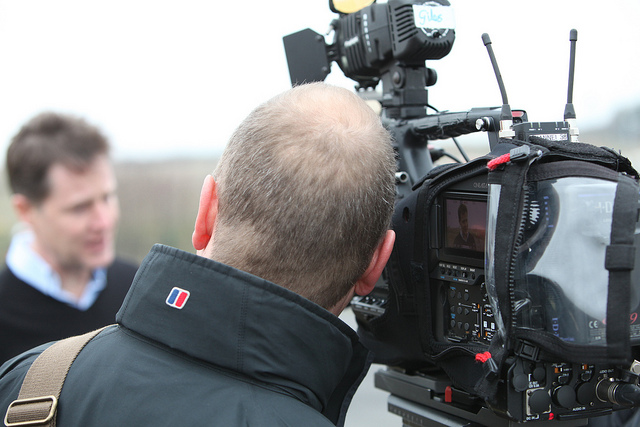Podcast: Play in new window | Download
Subscribe: RSS

At last the camera has found you. You’ve been waiting your whole life and now, because of something that happened to someone else, they want to know what you think. Our best advice: don’t do it. (Photo by Dave Radcliff/Flickr)
At the risk of — no, acknowledging the certainty of — sounding callous, and offending many, may I just say that I am tired of hearing from victims’ families? There is no shortage of life coaches, psychologists and members of other dubious professions to urge us all not to be a victim; why is no one pointing out that being related to someone who becomes famous as a victim is to be avoided at all costs, denied if at all possible, and — all else failing — endured in dignified silence. Being a victim-in-law does not confer special knowledge, rights, or merit. The fact that your uncle was killed by a meteorite does not make you an expert in meteorology (wait, does that track?) nor should it give you standing to sue the Hubble Telescope for failing to warn him in time.
Two things are in play here. One is the vast, insatiable appetite of the media for “great television,” which seems to consist of people either crying, raging or bloviating about a subject with which they have only a nodding acquaintance. Victims’ families give it all: crying (“He was my favorite second cousin once removed!”), raging (“How could they let this happen?”) and bloviating (“They need to build meteorite screens over populated areas right away. I don’t want this to happen to anyone ever again.”).
What passes for culture in our age comes to us from the black box in the living room. With spiritual advice from Oprah, medical advice from Dr. Oz, mental health counselling from Dr. Phil, historical perspective from the History Channel (where you can watch not only Pawn Stars, but Cajun Pawn Stars, to your heart’s content) legal advice from Judge Judy and current events from Fox News, you should have everything you need to be cool.
The second thing in play us that we seem to be as avid to blubber on TV as the TV producers are to have us on. It is evident that people study and remember how to act — this is an important part of acculturation — when sought out by the media, whether at mass murders (“He was quiet, really, kept to himself. We had no idea.”), tornadoes (“It sounded just like a freight train.”), explosions (“I thought a tomic bomb had gone off.”), deaths of the young (“She had her whole life in front of her.”), deaths of the old (“He didn’t deserve to go like that.”) and the all-purpose “I never expected something like that to happen here.” And if, in the stress and excitement of the moment, one’s proper role is forgotten, there’s always a cheerful news bimbo (or, if feminine, bimbette) to nudge one back on track (“Did it sound like a bomb? Were you surprised it happened around here?”)
This is just TV 101 for those who win the spectator, man-on-the-street lottery. (Sorry. Person-on-the-street. I just outraged a whole new class of victims.) But should you achieve the rank of victim-in-law, much more is expected of you. 9/11 victims’ families became instant (and, God help us, long-lived) bloviators on skyscraper design, airline safety and international affairs. Not to mention conspiracies. Oh, and movies (“9/11 family member outraged by Zero Dark Thirty”).
Currently on stage; the family members of passengers on the ill-fated Malaysian Airlines Flight 370. They are conducting near-riots to “demand answers” when the answers they want — what happened to the plane and where is it now — are not available. To anyone. Nevertheless, they are outraged because no one has given them the answers that no one has. They flock around the hovering TV cameras to vent their righteous rage. One of them screamed at a television camera, “How can you just lose a big airplane like that?” Well, look. See? This is how you do it.
And of course they are filing suit. With nothing known about what happened, or how it happened or why, they are nevertheless filing lawsuits alleging — well. what? What can you allege about an event about which you know nothing? Pay me because I’m outraged?
The only person who can save us from all this is Oprah. She must do a show on what you do when you find out you are related to a famous victim. Step One: Go Home. Don’t hang around a hotel lobby far from home, either because you think it gets you closer to the lost one (it doesn’t) or because you are attracted by the TV cameras (you shouldn’t be). Step Two: decline all invitations to bloviate on TV. Step Three: Grieve, in whatever private way gives you comfort, for the loved one you have lost.
We can do nothing at all about the fact that death comes to us all, at a time and place of its choosing. What we can do is face the inevitable with courage and dignity. Back to you, Oprah.
Tom – Thanks for writing this. I thought I was the only one who felt like this.
Yeah. Me, too.
Mercy, Tom, I can just hear your voice saying this. Expressing just what some of us feel and are afraid to say. Exactly. Thank you for sharing.
Oh! Well said! I especially like the use of “bloviate”.